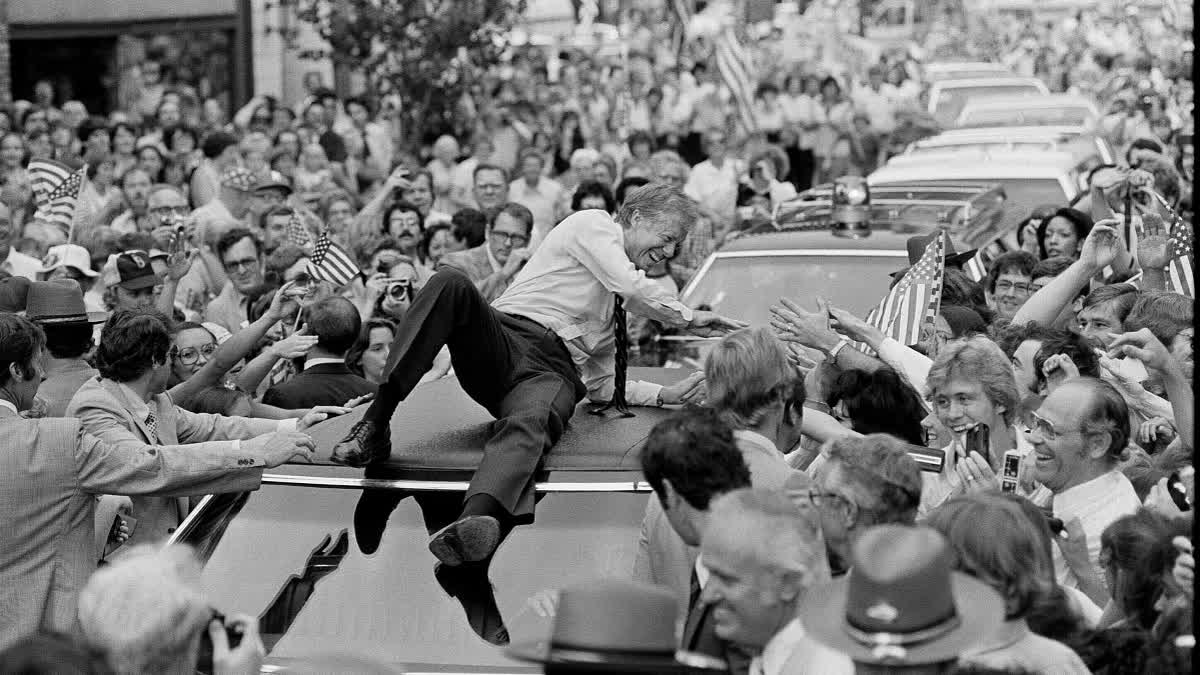New Delhi: Jimmy Carter, the 39th US president and the third American leader to visit India died at his home in Plains, Georgia on Sunday. He was 100, making him the longest-lived president in US history.
“Today, America and the world lost an extraordinary leader, statesman and humanitarian,” US President Joe Biden said in a statement mourning his loss. Carter is survived by his children — Jack, Chip, Jeff, and Amy; 11 grandchildren; and 14 great-grandchildren. He was predeceased by his wife Rosalynn and one grandchild.
Carter was the first American president to visit India after the removal of the emergency and victory of the Janata Party in 1977. In his address to the Indian parliament, Carter spoke against authoritarian rule.
“India's difficulties, which we often experience ourselves and which are typical of the problems faced in the developing world, remind us of the tasks that lie ahead. Not the Authoritarian Way,” Carter said on January 2, 1978.
A day later at the signing of the Delhi declaration along with then Prime Minister Morarji Desai, Carter said at the heart of the friendship between India and the US is their determination that the moral values of the people must also guide the actions of the states, and the governments.
According to the Carter Centre, on January 3, 1978, Carter and then First Lady Rosalynn Carter travelled to the village of Daulatpur Nasirabad in Gurgaon (now Gurugram) district of Haryana, an hour southwest of New Delhi. He was the third American president to visit India and the only one with a personal connection to the country – his mother, Lillian, had worked there as a health volunteer with the Peace Corps during the late 1960s.
“The visit was so successful that shortly after, village residents renamed the area 'Carterpuri' and remained in contact with the White House for the rest of President Carter’s tenure. The trip made a lasting impression: Festivities abounded in the village when President Carter won the Nobel Peace Prize in 2002, and January 3 remains a holiday in Carterpuri,” the Carter Centre said, adding that the visit laid the groundwork for an enduring partnership that has greatly benefited both countries.
A friend of India
At the signing of the Delhi declaration in the Ashoka Hall of the Rashtrapati Bhawan on January 3, 1978, Carter said: “The United States gave the world an illustration of a new form of government, with a new relation between the citizen and the state — a relation in which the state exists to serve the citizen, and not the citizen to serve the state,” he said.
“India experimented with creating political unity from overwhelming human diversity, enabling people of different cultures and languages and religions to work together, both in independence and also in freedom. Yours is an experiment whose success the world is celebrating anew,” Carter said.
“But India's successes are just as important because they decisively refute the theory that to achieve economic and social progress, a developing country must accept an authoritarian or totalitarian government and all the damage to the health of the human spirit which that kind of rule brings with it,” he told members of parliament.
“Is democracy important? Is human freedom valued by all people?... India has given her affirmative answer in a thunderous voice, a voice heard around the world. Something momentous happened here last March, not because any particular party won or lost but rather, I think, because the largest electorate on earth freely and wisely chooses its leaders at the polls. In this sense, democracy itself was the victor,” Carter said.
After the strain caused by the Nixon administration's infamous “tilt” toward Pakistan during the Indo-Pakistan War of 1971, Carter understood the critical importance of re-engaging with India as a democratic partner in a rapidly evolving global order.
His visit to India in 1978 was not merely symbolic but a substantive effort to rebuild trust and establish a framework for dialogue rooted in mutual respect and shared values, he said. “While Carter’s presidency was often viewed through the lens of domestic challenges, his contributions to US-India relations were transformative," Desai said. (Agency inputs)



